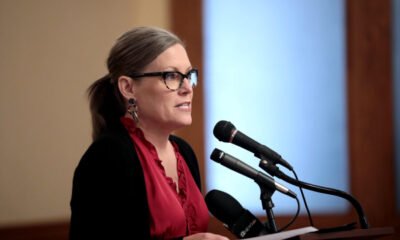2026 budget
Hobbs Finalizes Arizona Budget, Dodges Shutdown as House GOP Concedes

Arizona’s budget showdown has reached its conclusion. After prolonged negotiations and intense discussions, Democratic Governor Katie Hobbs signed the $17.6 billion state budget, achieved with bipartisan support. This decision came just before the crucial June 30 deadline to avert a government shutdown.
The budget’s approval followed a series of back-and-forth discussions between the House of Representatives, Senate, and the governor. The House endorsed the budget late Thursday with a vote of 41-15, while the Senate approved it with a 21-8 vote on Friday. Hobbs officially signed the budget later that evening, marking the end of the legislative session that started on January 13.
House Republicans had delayed the budget process significantly. They had exited negotiations and proposed their own $17.3 billion budget, which leaned heavily on conservative priorities but was ultimately vetoed by Hobbs. After further stalling, the House finally considered a bipartisan budget, albeit with minor adjustments.
Senators from both parties noted that the House passed a budget nearly identical to the one they had previously rejected, derisively referred to as the “Hobbs budget.” House Republicans proclaimed they had achieved “major concessions,” claiming around $100 million in savings, a figure that represents a mere 0.6% of the total budget.
Senate negotiator John Kavanagh confirmed that the main shift was simply the House finally agreeing to support the Senate’s proposal. He emphasized that the core elements of the budget remained intact from previous versions. Senate President Warren Petersen criticized the delays, describing them as a “sleight of hand” and urging Republican members to take accountability for the lengthy process.
The opposition mainly stemmed from members of the far-right Arizona Freedom Caucus, who attempted to obstruct consensus with futile amendments. Other Republicans expressed frustration, urging their colleagues to recognize the realities of a divided government. House Republicans cited various contributions to the Senate budget, many of which were already included prior to the recent amendments.
Key provisions in the final budget included 5% pay raises for state troopers, funding for a universal school voucher program, and support for developmental disabilities programs. Some amendments introduced in the House involved grants for local fire departments and updated reporting requirements for state agencies.
Despite these developments, several Democrats voiced their opposition. Senate Minority Leader Priya Sundareshan objected to the budget’s funding for border enforcement and criticized the absence of safeguards for the school voucher program. She underscored that the intense political negotiations demonstrated the consequences of refusing to accept the realities of governance.
Democratic Senator Theresa Hatathlie expressed similar sentiments, highlighting the lack of consultation with Native lawmakers and the absence of funding for tribal initiatives. She condemned the behavior of those who stalled the process, emphasizing the negative impact on constituents anxious about a potential government shutdown.
The resolution of the budget underscores both the persistent divisions within Arizona’s legislature and the challenges of navigating a divided government. As the state prepares for the year ahead, the recent deliberations serve as a reminder of the complexities involved in state governance.

















